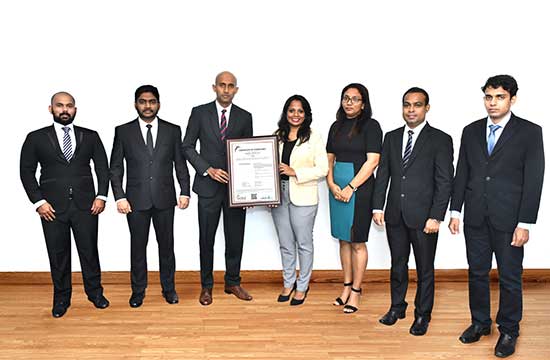Business
Dialog Axiata’s Genie Fintech platform recertified for PCI DSS

L-R – Chathuranga Gunatillake – Senior Information Security Engineer, Nalinda Herath – Lead Security Engineer, Dileepa Lathsara – CEO – TechCERT, Gimali Soysa – Chief Manager- FinTech, Sonali Nonis- Unit Manager- Quality Systems, Geeth Sameera- Specialist- Information Security, Ashitha Kandambige-Specialist- DS & VAS Services, Dialog Axiata PLC
Genie platform offered by Dialog Axiata PLC, was re-certified the coveted Payment Card Industry Data Security Standard (PCI DSS) Version 3.2.1 for the 4th consecutive year from Qualified Security Assessor (QSA) SISA Information Security together with TechCERT, the local consultant and the technical service provider.
PCI DSS ensures the security of cardholder data for credit/debit cards from major card schemes by preventing frauds and data breaches. This is achieved by enforcing leading security controls over the storage, transmission, and processing of cardholder data.
Commenting on this milestone achieved, Renuka Fernando, Chief Digital Services Officer of Dialog Axiata PLC stated, “At Genie, security is placed at top-priority and over the years, we have endeavoured to provide our customers with greater convenience through innovative digital solutions whilst also ensuring that steps are taken to uphold and maintain their privacy and security. On this Genie will remain committed to providing a secure and convenient transaction platform to enable and enhance Sri Lanka’s digital payment landscape”
PCI DSS is the global data security standard adopted by the payment card brands for all entities that process, store or transmit cardholder data and/or sensitive authentication data. Administered by the PCI Security Standard Council, it has 12 essential security compliance requirements which fall into six categories. These categories are; build and maintain a secure network, protect cardholder data, maintain a vulnerability management programme, implement strong access control measures, regularly monitor and test networks, and maintain an information security policy. This set of standards have been developed over time in an ever-evolving security landscape and are intended to provide merchants, financial institutions and customers peace of mind.
Genie is Sri Lanka’s first and only PCI-DSS certified mobile payment application and allows users to add their Visa/Mastercard, Current/Savings Account or eZ Cash account as payment options to the app to make remote payments, in-app payments, over-the-counter payments (OTC via QR Code) at 12,000+ merchant points, and conduct online payments more safely and conveniently.
As COVID-19 accelerated digital transformation and further enforced the need for tighter cyber-security, Genie met these emerging needs head-on. Most recently, Genie enhanced their e-payment security model with the adoption of tokenization technology (replacing sensitive information with a random string of unique characters called “tokens”) and 3D Secure (a simple 3-step verification process) to combat cyber fraud. Additionally, Genie was instrumental in creating avenues of cashless payment transactions in the country, abiding by national social distancing efforts during the pandemic, through partnerships with Eat Me Global and Meatdeal.lk to deliver essential items to customers. Pay by Genie further extended its seamless service to the education sector and healthcare sector to secure academic payments and doctor bookings digitally.
Business
Cabinet approves CECB as consultant for renovation of the Karainagar boat yard project

The Cabinet of Ministers has approved the proposal presented by the Minister of Fisheries, Aquatic and Marine Resources to seek the services of the Central Engineering Consultancy Bureau as a consultant for the renovation of the Karainagar boat yard project and allocate 40 million rupees from the Treasury for the expenditure to be borne by the Government of Sri Lanka.
[A memorandum of understanding was signed by the President during his official visit to India in December 2024. , to obtain a grant from the Government of India for the renovation of the Karainagar Boat Yard
According to the MOU, the responsibility of providing the technical consultancy service for the project and exempting the goods and equipment related to the grant from taxes has been assigned to the government of Sri Lanka.]
Business
‘Transformative infrastructure’ installed at Colombo West International Terminal

In a landmark move for Sri Lanka’s logistics landscape, EFL Project Logistics has completed a critical phase of deliveries for the Colombo West International Terminal (CWIT), a transformative infrastructure project poised to reshape the country’s role in global maritime trade.
CWIT—a collaboration between Adani Ports and SEZ Ltd (51%), John Keells Holdings and the Sri Lanka Ports Authority—is set to be the island’s first fully automated deep-water terminal. As it gears up for full commercial operations in 2025, the recent arrival of high-tech port handling equipment marks a key economic inflection point for Sri Lanka.
Speaking exclusively to The Island Financial Review on the impact, Mohamed Niyas, General Manager – Project Logistics at EFL, said, “The logistics we executed for CWIT are more than just cargo movements; they are catalysts for economic transformation. These deliveries—ranging from electric inter-terminal trucks to automated gantry cranes—are essential to positioning Sri Lanka as a sustainable, high-capacity transshipment hub.”
Among the highlights of the operation were 62 state-of-the-art Sany electric trucks and massive quay and gantry cranes, representing not only a technical leap but also a green one. These advancements contribute to CWIT’s eco-efficient design and bolster Colombo’s capacity to handle up to 15 million TEUs by 2026.
Economically, the development of CWIT—and EFL’s role in its expedited setup—signals a push for increased foreign direct investment, enhanced export competitiveness and job creation across the logistics and engineering sectors. As Niyas emphasized, “We are not just helping move cargo; we are enabling national economic value. Every successful delivery brings us closer to a future where Sri Lanka is a leading player in the South Asian maritime corridor.”
With global shipping routes evolving and automation driving next-gen port operations, CWIT is seen as a strategic asset for long-term growth. EFL’s role in the project showcases the kind of logistics innovation necessary to support this ambition—efficient, sustainable and globally competitive.
By Ifham Nizam
Business
Marine Tourism Roadmap for Sri Lanka launched by SLTDA

Sri Lanka marked a major milestone in its tourism development efforts with the official launch of the Marine Tourism Roadmap on April 10 in Colombo. This initiative, led by the Sri Lanka Tourism Development Authority (SLTDA) with support from the Asian Development Bank (ADB) under its technical assistance program TA9881 SRI: Supporting Tourism Resilience, lays the groundwork for a new chapter in tourism and the nation’s blue economy.
The Marine Tourism Roadmap was developed through an extensive process of data collection, stakeholder consultations and site visits conducted by the ADB appointed international consultant together with officials of the SLTDA. The final validation of the Roadmap was done by the Marine Tourism Steering Committee, which included representatives from key marine related public and private sector institutions. International expertise was provided by Ms. Aleksandra Dragozet (CEO & Founder – Sea Going Green), ADB’s appointed marine tourism consultant, whose guidance ensured the strategy aligned with global best practices for sustainable tourism. The SLTDA officials, Dr. Prasad Jayasuriya, Director-Tourism Planning, Development & Investments and S Dadeepan, Assistant Director-Tourism Planning & Development coordinated all meetings, site visits and activities with relevant stakeholders and the Steering Committee.
The Marine Tourism Roadmap emphasizes a balanced approach between conservation and economic development, promoting eco-friendly activities such as diving, snorkeling, ship wreck diving and marine wildlife watching. These activities are designed to support local livelihoods while safeguarding Sri Lanka’s rich marine biodiversity, particularly coral reefs, marine mammals, and fragile coastal habitats that face increasing environmental pressure. The strategy outlines two categories of coastal destinations: areas covering Kalpitiya through Galle to Trincomalee, which possess established marine tourism industries; and areas covering Mannar, Jaffna and the North-Eastern coastal belt, which are recognized for their emerging tourism potential. Notably, Sri Lanka’s ocean territory is nearly seven times larger than its landmass, highlighting the vast, untapped opportunities for marine-based tourism. The roadmap presents both short-term and long-term implementation strategies, aiming to develop sustainable marine tourism infrastructure, enhance visitor experiences, and ensure the protection and resilience of marine ecosystems in the years ahead.
The Roadmap itself was the result of collaboration among stakeholders covering coastal areas of Negombo, Kalpitiya, Mannar, Jaffna, Mullativu, Trincomalee and Galle and also the Steering committee members representing 18 key marine related public and private sector institutions including Presidential Secretariat, Ministry of Tourism and the SLTDA. This unified approach ensured that the document reflects the diverse perspectives of stakeholders directly involved in marine and coastal tourism development.
-

 Business4 days ago
Business4 days agoDIMO pioneers major fleet expansion with Tata SIGNA Prime Movers for ILM
-

 News3 days ago
News3 days agoFamily discovers rare species thought to be extinct for over a century in home garden
-

 Features6 days ago
Features6 days agoNipping the two leaves and the bud
-

 Features6 days ago
Features6 days agoAvurudu celebrations … galore
-

 Features5 days ago
Features5 days agoProf. Lal Tennekoon: An illustrious but utterly unpretentious and much -loved academic
-

 Foreign News3 days ago
Foreign News3 days agoChina races robots against humans in Beijing half marathon
-

 News6 days ago
News6 days agoCounsel for Pilleyan alleges govt. bid to force confession
-

 Editorial4 days ago
Editorial4 days agoSelective use of PTA












